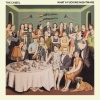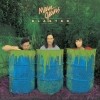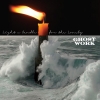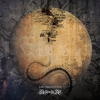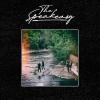Gig Reviews

Cult Leader
Stengade, Copenhagen, DEN - 15/4
Album Reviews
Rocksmith - A Next-Gen Guitar Game
Previous Nextauthor PP date 24/02/13
Learning guitar or bass isn't easy. It requires patience, constant practice, and usually, a skilled teacher who can show you at least the basics of different techniques required for the songs you wish to play. For self-learning, the internet is an invaluable resource with YouTube lessons, fan-submitted tablatures, and all the other elements you need to get started. But both ways of learning miss an important, and, in my opinion, a vital ingredient that caters to the ADD generation: instant feedback.
That's where Guitar Hero and Rock Band came in back in the day. Even though you were using a plastic instrument limited to mere five buttons and a single strummer representing the chords, you felt like you were actually playing the songs on the higher difficulty levels, and it was fun, because the game didn't lie: when you failed, you got booed and had to start over, and when you succeeded, the crowd cheered. There was an instant satisfaction associated with learning a challenging section and mastering it perfectly for that crazed guitar solo.
But while these games could teach you about tempo and strumming, they are no replacement to actually playing the songs on a real guitar or bass. Learning to ace that Dragonforce song on expert difficulty setting didn't magically convert into an ability to play a three chord Blink 182 song eyes closed.
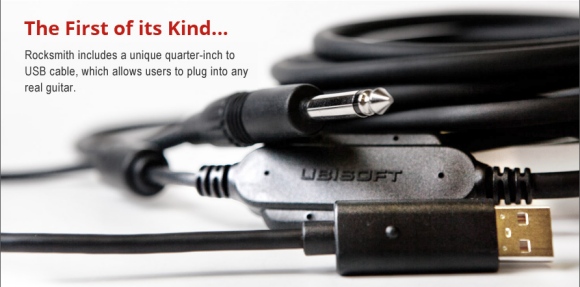
Rocksmith's Real Tone Cable
That's where Rocksmith hopes to step in and fill the void. The concept in principle is virtually unchanged: choose your favorite rock songs and play them for instant feedback. Except Rocksmith is played on a real guitar or on a real bass. If you can plug your guitar into an amp, you can also plug it into Rocksmith, because the UbiSoft crew behind the title set out to invent and develop a USB-to-guitar jack adapter that converts the analogue signals to a digital signature that the game can recognize - called 'Real Tone Cable'. Here's a promotional video from the game's original launch:
So can you really learn how to play guitar through a video game? At what point does a video game transform from being just a game into being a teaching tool? Can a video game replace the need for hiring a teacher for a weekly session? We set out to answer these questions back in December after hearing much hype and acclaim for the game around its European release in October, and have since then found ourselves lost in the Rocksmith universe's instant appeal.
Rocksmith is available for PC, Xbox 360, and PlayStation 3, and comes with a bundle that includes the game and the required Real Tone Cable to plug-in your guitar. If you've ever played the Guitar Hero and Rock Band series, you'll already be fairly familiar with the format: as a starting guitarist, you go through a 'journey' of sorts, unlocking new instruments, venues, amps, sounds, and technique challenges as you go along.
The songs themselves are presented on a vertical scrolling note chart, which at first may feel overtly complex and detailed as the notes start flying in your direction, but it doesn't take long to get the hang of it. Only the relevant part of the fret are visible at any given time, and as you shift from third fret to the sixth one (or twelfth one etc), the camera zooms out and moves sideways, following the fret numbering that's clearly laid out at the bottom. This way, the game can cover the entire fret of your guitar without overwhelming the player with too much miniscule detail.
Creative director Paul Cross explains the game in a nutshell
Rocksmith uses a dynamic difficulty algorithm, which evaluates how well you do in each section of the song, adding and/or removing notes depending on your skill level. Beginners will experience a mode similar to the 'easy' mode on Guitar Hero, where you'll never see chords or difficult solos, rather than just individual notes spaced out to give you time to adjust your hand position on the fret accordingly. Those with more experience will see increasingly more notes and chords added until you're playing every note that was recorded in the studio track.
It's a nice idea, but in practice, however, the game can be brutally honest about your mistakes sometimes. Even though you can't fail songs so that you must start over, botching a significant part of a section will almost certainly mean that the next passage will be automatically adjusted to an easier difficulty setting. This can be quite annoying especially when you're sure that you would nail the next section perfectly no matter what.
For guitar novices like myself, even the simpler songs can be overwhelming despite my considerable experience with other music games in the past. When you have no idea how to position your hand to play chords, and switching from a C to an E minor seems like an insurmountable task, the game can feel frustrating at first as opposed to fun. But that's all part of the experience: the point is to teach you how to play guitar, not to get a cheap thrill by using shortcuts. In real life, you would normally have someone teach you how to do the different techniques, and then set off to practice them through repetition and more repetition until you've mastered them. The UbiSoft team has thought of this part of the learning process as well. To supplement the dynamic difficulty setting and other features designed to help novices along the way, they've included three special features that function as the 'lessons' part of the game.
Technique Challenge - teaching you palm muting
The first, and perhaps the most important one, is called technique challenge. As you proceed on your journey and songs become more difficult, you will run into new techniques you haven't used before if you're new to guitar. Here, the game reminds you to step away from songs on your setlist and play a technique challenge, which is a pre-recorded video where an instructor shows you what to do, and then gives you a short passage to play specifically designed for the technique. Learning how to do palm-muted strings, and how to hold your fingers for different chords were all extremely useful to see from a video perspective instead of just reading a tip on how to do it.
"Dawn Of The Chordead" - a mini-game designed to teach you chords and shifting
The second one is called 'Guitarcade'. It features eight arcade style mini games designed to make you practice the techniques you've learned. Having difficulty switching chords? Play the zombie-shooter game "Dawn Of The Chordead" where bloodthirsty undead are approaching your truck, and only by playing the chord correctly will you be able to shoot them down. Want to learn the scales to different chords? Play the temple runner inspired "Scale Runner".
The third feature is bundled up into two modes to practice specific sections in a selected song. Riff Repeater allows quite literally you to repeat riffs by changing the speed and difficulty setting manually. Leveler is designed to repeat the same section until you get it right starting from the easiest difficulty setting, and once you hit near 100%, the game automatically adds more notes/chords to the next attempt.
Oh, and if you were worried about how to tune your guitar - don't worry. The game helps you tune your guitar at the start of every song, meaning that if you need to play a song in Drop D tuning, it'll help you adjust your strings accordingly.
Foo Fighters DLC
Because the game allows you to connect either a guitar or a bass (or an emulated bass) to your device, it also means you can bring a friend over and play the songs in split-screen mode. Starting a band and jamming out has never been this easy, especially because the game also features a free play mode, where you can play your own songs while using all of the available amps and effects pedals you've unlocked in the game. Forget about bringing an amp along, just bring a guitar and bass, and start jamming. And if you grow tired of the wide array of classic rock songs found on the setlist, Rocksmith offers weekly downloadable content which usually covers fan-requested material. I purchased a Blink 182 song pack to check it out, but you also have access to songs by Lamb Of God, Avenged Sevenfold, and Fall Out Boy among many others.
So what do we make out of the learning experience as a whole? While it's an extremely useful tool as a learning tool, it is exactly that and nothing more - a learning tool. It is not a shortcut to make you into the greatest guitarist the world has seen. It requires the same amount of patience and practice as learning guitar in the traditional way does. The advantage here is that you get instant feedback, and it's generally easier to learn how to play the songs and techniques, because instead of having to wait to the next agreed lesson with your instructor, you can just go straight to the technique challenges and re-learn how to do it.
To install the game and plug-in my guitar is easy - but to continue practicing frustrating sections is just as frustrating as it was doing it the traditional way. At the same time, the game adds an element of fun to especially the monotonous repetition that you have to do in order to improve. I found myself often spending more time in the guitarcade shooting zombies or using the scale runner game to improve my technical ability rather than memorizing specific songs into muscle memory. The video guides for finger positioning, hammer-ons, pull-offs, palm muting, et cetera were also extremely useful, and something I returned to over and over again to remind myself how the specific technique is intended to be used. I'm convinced that if, like me, you're interested in learning how to play guitar, Rocksmith goes a long way into helping you do just that. I've gone from being a complete novice into easily shifting between chords and playing difficult songs with relative skill, which is much more than I expected when I first got started with the game.
Muse - Unnatural Selection with combined camera of guitarist + notes
The feedback I've gotten from more experienced guitarists is that the games automatic difficulty can be annoying when you accidentally make a mistake or two. But at the same time, if you're a wizard to start out with, then Rocksmith is probably not targeted towards you. It's definitely more of a learning tool than it is an actual game, even though it attempts to combine both together seamlessly. Perhaps the ultimate mode is something for the experts, where the game hides all notes and expects you to have memorized how to play the song from start to finish. I think it'll take me years to get to that level - except maybe in the Blink 182 song pack that I purchased.
Here's a short summary of pros and cons that I've come up with after spending a couple of months with the game.
Pros:
- Beginner-friendly replacement of a real teacher
- Guitarcade mini games to help you improve in specific techniques
- Learning tools like technique challenge and riff-repeater/leveler
- Instant feedback to your progress as an aspiring guitarist
- Lots of interesting DLC on top of a good setlist
Cons:
- TV audio/video lag can be an issue unless you connect audio via your home theater setup
- Dynamic difficulty can be annoying for skilled guitarists
- Long loading times on consoles (on PC this is non-existent)
So is Rocksmith as revolutionary as its marketing campaign claims? I would say it's pretty close. The ability to plug-in virtually any guitar and just shred away is something I found myself wishing for every time I played Guitar Hero. It still has some unresolved technical issues, but that is to be expected given how new the technology involved is at this point in time. In any case, Rocksmith is currently the state-of-the-art when it comes to music games, and if you're the least bit curious in learning guitar, I would consider it an essential purchase if you don't want/can't afford a real teacher.
 Twitter
Twitter Facebook
Facebook

